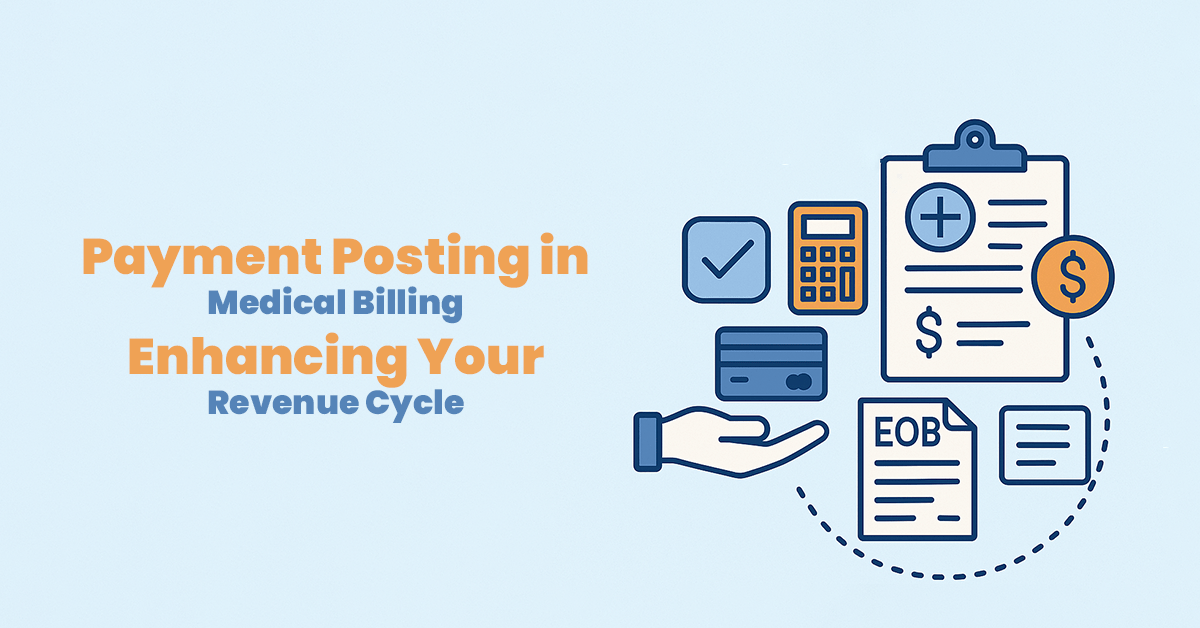Introduction
Mental health care is evolving quickly, but billing remains a major challenge for many providers and small practices.
Psychiatrists, psychologists, and therapists struggle with changing regulations, code updates, and confusing reimbursement policies.
These billing complexities not only delay payments but also affect trust between providers and patients.
Accurate billing is more than just paperwork—it ensures faster reimbursements, improves compliance, and builds patient confidence.
Mistakes in codes or documentation can lead to claim denials, lost revenue, and increased administrative stress.
By improving your mental health billing process, your practice can focus more on care and less on collection.
This guide will walk you through every key aspect of mental health billing services.
We’ll explore CPT codes, telehealth billing, modifiers, outsourcing, and how to choose the right billing partner.
You’ll also learn how to reduce common billing errors and optimize reimbursement for both in-network and out-of-network claims.
Whether you run a private practice or a group facility, this guide provides practical insights to simplify your workflow.
Our goal is to help you maximize cash flow while improving patient satisfaction and operational efficiency.
Let’s dive into the world of mental health billing and uncover the tools you need to streamline your revenue cycle.
What Are Mental Health Billing Services?
Mental health billing services handle the entire financial cycle for behavioral health providers and therapy-based practices.
They manage tasks like claim preparation, insurance verification, coding, claim submission, payment posting, and denial management.
This specialized service ensures providers receive accurate and timely reimbursements for therapy and psychiatric care sessions.
Mental health billing services support a variety of licensed professionals across outpatient and private settings.
These include psychiatrists, psychologists, licensed clinical social workers (LCSWs), and licensed professional counselors (LPCs).
Each of these providers has different documentation, coding, and reimbursement requirements based on their credentials and services.
Unlike general medical billing, mental health billing requires detailed documentation for time-based services and treatment plans.
Sessions often vary in length, and insurers require specific CPT codes that reflect duration and clinical complexity.
Behavioral health claims also face unique scrutiny regarding medical necessity, frequency limits, and progress note requirements.
Another major difference lies in pre-authorizations and recurring visit approvals, which are more common in therapy-based services.
General medical billing may use broad ICD codes, while mental health billing demands precise behavioral or psychiatric diagnosis coding.
Without expert handling, providers often face denied claims, delayed payments, or compliance issues with mental health regulations.
That’s why most successful practices partner with billing professionals who understand therapy-specific requirements and payer-specific rules.
A tailored mental health billing service reduces administrative load while helping providers focus more on direct patient care.
The Mental Health Billing Process Step-by-Step
Efficient billing begins with a structured process designed to reduce errors and increase timely reimbursements.
Here’s a step-by-step guide to how the mental health billing process works in modern private practices.
Patient Intake and Insurance Verification
The process starts by collecting accurate patient demographics and verifying active insurance coverage.
Billing staff must confirm policy status, copayments, deductibles, and mental health service eligibility before scheduling appointments.
Accurate verification avoids future denials and ensures patients understand their financial responsibility from the beginning.
Pre-Authorization Requirements
Some payers require pre-authorization before the first session or after a certain number of visits.
This step involves submitting treatment plans and medical necessity documents to insurers for approval before rendering services.
Missing this step leads to rejected claims and revenue loss—even if care has already been provided.
Clinical Documentation
Mental health providers must maintain clear, timely, and compliant clinical notes for every session.
Documentation should match CPT codes, prove medical necessity, and include treatment goals and progress updates.
Incomplete or vague records often trigger payer audits or denied reimbursements.
Claim Submission with CPT and ICD-10 Codes
Claims must be coded using appropriate CPT codes for services and ICD-10 codes for diagnosis.
Errors in codes result in rejections, delays, or underpayment by insurers.
Accurate coding reflects session length, modality, and complexity for maximum reimbursement.
Follow-Ups, Denial Management, and Resubmissions
Rejected or denied claims must be tracked, analyzed, and resubmitted quickly to avoid payment delays.
Billing teams contact payers for clarifications, correct errors, and provide missing documentation for resolution.
Payment Posting and Patient Billing
Once payment is received, it’s posted to the patient’s account and statements are generated for any balance.
Patients must receive clear bills with service dates, payment breakdowns, and instructions for submitting questions.
Common CPT Codes in Mental Health Billing
Understanding CPT codes for mental health is essential for accurate billing and full reimbursement.
Each code represents a specific service type, session duration, or billing scenario.
90791 – Psychiatric Diagnostic Evaluation
Used during initial assessments by psychiatrists, psychologists, or licensed therapists.
This code covers history review, mental status evaluation, and treatment planning without medical services.
Providers cannot use 90791 and 90792 together for the same visit.
90834 – 45-Minute Psychotherapy Session
This is the most commonly used code for mid-length therapy sessions.
It applies to individual counseling focused on mental health disorders or emotional concerns.
Always document time spent and clinical intervention clearly.
90837 – 60-Minute Psychotherapy Session
Used for extended therapy sessions involving deep therapeutic interventions.
Reimbursement is higher than 90834 but requires solid documentation to justify medical necessity.
Some payers may review 90837 claims more strictly.
90853 – Group Therapy
Used when treating multiple patients simultaneously in a therapeutic setting.
Does not include family members or social gatherings—clinical intervention must be present.
Documentation must reflect group goals, participation, and outcomes.
90785 – Interactive Complexity Add-On
Used in combination with primary therapy codes when communication is complex.
Applies to sessions involving children, third parties, or language barriers.
This code enhances reimbursement but requires very specific documentation.
Importance of Accurate Coding
Using incorrect CPT codes can lead to claim denials or underpayment.
Proper coding ensures compliance, maximizes reimbursement, and reflects the true value of services rendered.
Stay updated with 2025 CPT changes to avoid disruptions in cash flow.
Mental Health Billing Modifiers You Should Know
Mental health billing modifiers give insurance payers extra information about provided services.
Using them correctly avoids denials and ensures full reimbursement for eligible procedures.
Below are the key mental health billing modifiers every provider must understand.
Modifier 25 – Separate E/M Service on the Same Day
This modifier is used when an evaluation and management (E/M) service occurs during a therapy visit.
The services must be distinct and medically necessary.
Example: A psychiatrist adjusts medication and also provides a therapy session.
Modifier 95 – Telehealth Session via Audio/Video
Use Modifier 95 for real-time audio and video telehealth sessions.
This modifier became essential post-COVID and continues to be widely accepted in 2025.
Always ensure documentation shows technology used and patient consent.
Modifier GT – Real-Time Telehealth Encounter
GT is another telehealth modifier, though less common than 95 in current payer systems.
Use it for synchronous interactions via secure video platforms.
Some payers may require GT instead of 95, so check policies first.
Modifier 59 – Distinct Procedural Service
Apply this modifier when billing multiple, separate procedures during one visit.
It shows the procedures were independent and not bundled.
Clear documentation must support why services weren’t related.
Incorrect Modifier Use Causes Denials
Incorrect modifiers lead to rejected claims, delayed payments, and compliance audits.
Overusing or misusing modifiers may also flag your practice for payer scrutiny.
Stay updated with payer rules and modifier updates for mental health billing in 2025.
In-Network vs Out-of-Network Mental Health Billing
Understanding the billing differences between in-network and out-of-network providers is essential in 2025
Each model has unique rules, reimbursement timelines, and documentation requirements.
In-Network Billing Predictable but Restrictive
In-network providers sign contracts with insurance companies.
These contracts define reimbursement rates and billing procedures.
Claims are processed faster, and patients usually pay less out-of-pocket.
However, reimbursement rates are lower than out-of-network billing.
Documentation must align with payer-specific policies to avoid delays.
Errors may trigger audits or delayed payments.
Out-of-Network Billing More Flexibility, More Challenges
Out-of-network (OON) providers do not contract with insurance companies.
They set their own rates and bill patients or insurers directly.
Claims often require more documentation and pre-authorization.
Reimbursement takes longer, and patients may face high costs.
Many patients don’t understand their OON benefits, creating confusion.
Denied claims are common without expert guidance.
How Billing Services Help With Both Models
A billing company handles payer rules for both billing types.
They ensure claims follow payer guidelines, reducing rejections.
For in-network providers, they improve clean claim rates and reimbursements.
For OON providers, they assist with benefit verification and timely submissions.
They also help patients understand co-pays, deductibles, and out-of-pocket estimates.
A good billing partner ensures steady revenue, regardless of network status.
Mental Health Billing for Telehealth Services (Post-COVID Changes)
The pandemic reshaped mental health care delivery.
Telehealth is now a mainstream option for therapy and psychiatric care.
Billing for telehealth requires precision with CPT codes and modifiers.
CPT Codes and Modifiers for Telehealth in Mental Health
Use standard CPT codes for therapy: 90791, 90834, 90837, and others.
Apply telehealth-specific modifiers to indicate remote sessions.
Modifier 95 is used for real-time audio/video communication.
Modifier GT also shows real-time telehealth but is payer-specific.
Use correct POS codes, like 02 or 10, based on location.
Incorrect combinations often trigger denials or reduced payments.
Insurance Policy Updates for Telehealth (2025)
Many insurers extended telehealth parity laws beyond the pandemic.
Medicare and Medicaid now cover a wide range of remote sessions.
Private insurers follow suit, but policies differ by state and plan.
Some require pre-authorization or have frequency limits per month.
Verify coverage before each visit to avoid denied claims.
Telehealth Documentation Requirements
Document start and end time of each session clearly.
Note the patient’s location and provider’s location during the session.
Include consent for telehealth treatment in the patient record.
Explain the clinical necessity for remote care when required.
Ensure HIPAA compliance in all telehealth platforms and records.
Top Billing Errors in Mental Health Practices
Even experienced providers make billing mistakes that delay or deny reimbursements.
Recognizing and avoiding these errors ensures cleaner claims and faster payments.
Incorrect CPT/Modifier Combinations
Pairing the wrong CPT code with an invalid modifier causes instant rejections.
For example, Modifier 95 used with an in-person code results in denial.
Ensure each code and modifier accurately reflects the service delivered.
Missing or Incomplete Documentation
Incomplete progress notes or missing session details delay claim approval.
Every claim must match clinical documentation exactly to meet payer guidelines.
Include time, diagnosis, and medical necessity for every session.
Billing the Wrong Payer
Submitting claims to inactive or incorrect insurance plans leads to wasted time.
Verify insurance eligibility during every patient visit.
Check for any updates to primary or secondary coverage.
Duplicate Submissions
Sending the same claim twice without proper flags may result in denials.
Use tracking tools to monitor each claim’s progress before resubmitting.
Duplicate submissions may also raise red flags during audits.
How Billing Services Help Prevent These Errors
Experienced billing companies follow strict review protocols before submission.
They ensure correct coding, payer verification, and documentation alignment.
Billing experts reduce human errors, improve claim accuracy, and boost revenue.
Why Outsource Your Mental Health Billing?
Handling billing in-house may limit your practice’s growth.
Outsourcing allows you to improve efficiency, revenue, and patient satisfaction without hiring extra staff.
Improved Cash Flow and Faster Reimbursements
Billing companies submit claims accurately and on time.
Their expertise ensures fewer delays in the payment process.
Faster reimbursements help you manage cash flow more efficiently.
Fewer Claim Denials
Billing experts know how to avoid coding and modifier errors.
They track payer rules, reducing the risk of rejections.
Clean claims reduce administrative rework and speed up collections.
Time Saved on Administrative Tasks
Outsourcing frees your team from data entry and claim follow-ups.
You’ll have more time to focus on patients, not paperwork.
Let billing professionals handle insurance headaches while you provide care.
Increased Focus on Patient Care
Administrative stress affects your clinical performance and focus.
Removing billing responsibilities improves morale and patient interactions.
Providers spend more time treating and less time troubleshooting claims.
Better ROI with a Specialized Billing Partner
Outsourced billing boosts revenue with fewer overhead costs.
You don’t need to train or manage an internal billing team.
Expert billers maximize reimbursements, making outsourcing a smart investment.
Choosing the Right Mental Health Billing Partner
Selecting the right billing partner is crucial to your practice’s success.
A trusted partner ensures compliance, fast payments, and minimal disruptions to your workflow.
Ensure HIPAA Compliance
Your billing company must strictly follow HIPAA guidelines.
Protected health information must remain secure and confidential at every step.
Confirm the partner uses encrypted software and safe data handling procedures.
Look for Mental Health Billing Expertise
Mental health billing is different from general medical billing.
Choose a team experienced in handling psychotherapy codes, modifiers, and pre-authorization rules.
They should understand the needs of psychiatrists, therapists, and counselors.
Demand Advanced Billing Technology
Modern billing software increases efficiency and reduces human errors.
Look for cloud-based tools with real-time tracking, automatic claim updates, and secure communication.
Good tech leads to fewer denials and faster reimbursements.
Insist on Transparent Reporting
You should always know where your revenue stands.
The right billing partner provides detailed reports on claims, collections, and rejections.
Transparency helps you measure performance and make smart decisions.
How HS MED Solutions Supports Mental Health Providers
At HS MED Solutions, we specialize in mental health billing services.
We support psychologists, psychiatrists, LCSWs, and LPCs with tailored solutions.
Our secure systems, trained professionals, and transparent processes deliver unmatched results.
Choose wisely—your practice’s financial health depends on it.
Let HS MED Solutions handle your billing while you focus on patient care.
Simplify Mental Health Billing and Strengthen Patient Trust
Mental health billing is complex.
From CPT coding to modifier use and insurance changes, every detail affects your revenue and compliance.
Common issues—denials, slow payments, and documentation errors—can overwhelm even the most experienced practices.
You don’t have to face these billing challenges alone.
A structured process, accurate coding, and expert support make a significant difference.
Outsourcing your billing can improve cash flow, reduce administrative burden, and free your team to focus on patient care.
Now is the time to evaluate your billing workflow.
Ask yourself: Is your current process giving you control, visibility, and results?
Ready to streamline your mental health billing? Let’s talk.
✅ Partner with HS MED Solutions and let us handle your billing—so you can focus on healing others. Contact us today!







